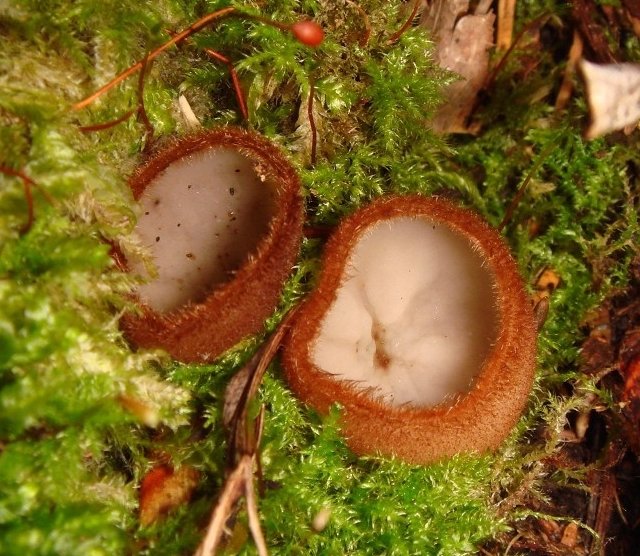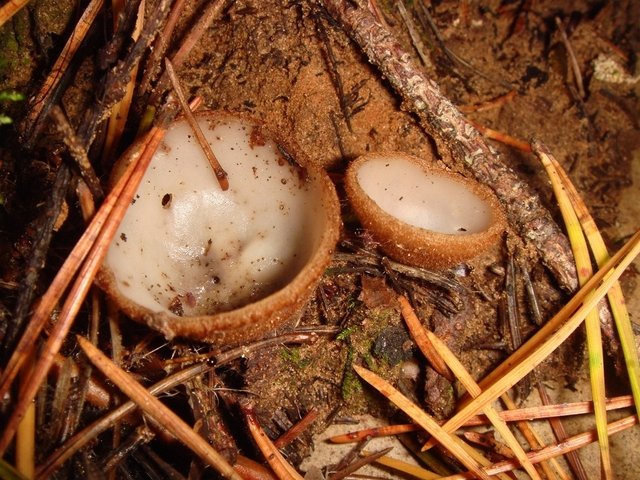Hemispherical humaria (Humaria hemisphaerica)
- Dipartiment: Ascomycota (Ascomycetes)
- Subdiviżjoni: Pezizomycotina (Pezizomycotins)
- Klassi: Pezizomycetes (Pezizomycetes)
- Sottoklassi: Pezizomycetidae (Pezizomycetes)
- Ordni: Pezizales (Pezizales)
- Familja: Pyronemataceae (Pyronemic)
- Genus: Humaria
- Tip: Humaria hemisphaerica (Humaria hemisphaerica)
:
- Helvella white
- Elvela albida
- Peziza hispida
- Peziza label
- Peziza hemisphaerica
- Peziza hirsuta Holmsk
- Peziza hemisphaerica
- Lachnea hemisphaerica
- Hemispherical burials
- Scutellinia hemisphaerica
- White burials
- Mycolachnea hemisphaerica

Before us is a small cup-shaped mushroom, which, fortunately, is easily identified among many similar small “cups” and “saucers”. Hemispherical humaria rarely grows more than three centimeters in width. It has a whitish, grayish, or (more rarely) pale bluish inner surface and a brown outer surface. Outside, the mushroom is completely covered with hard brown hairs. Most of the other small calyx mushrooms are either brightly colored (Elf’s Cup) or smaller (Dumontinia knobby) or grow in very specific places, such as old fire pits.
Korp tal-frott formed as a closed hollow ball, then torn from above. In youth, it looks like a goblet, with age it becomes wider, cup-shaped, saucer-shaped, reaches a width of 2-3 centimeters. The edge of young mushrooms is wrapped inward, later, in old ones, it is turned outward.
The inner side of the fruiting body is dull, light, often wrinkled at the “bottom”, in appearance it is somewhat reminiscent of semolina. Becomes brownish with age.
The outer side is brown, densely covered with brown fine hairs about one and a half millimeters long.
Leg: nieqsa.
Riħa: not distinguishable.
Togħma: L-ebda dejta.
Polpa: light, brownish, rather thin, dense.
Mikroskopija: Spores are colorless, warty, ellipsoid, with two large drops of oil that disintegrate when they reach maturity, 20-25 * 10-14 microns in size.
Asci are eight-spored. Paraphyses filiform, with bridges.

Hemispherical humaria is widely distributed throughout the world, growing on moist soil and, less often, on well-decayed wood (presumably hardwood). It occurs infrequently, not annually, singly or in groups in deciduous, mixed and coniferous forests, in thickets of shrubs. Fruiting time: summer-autumn (July-September).
Some sources categorically classify the mushroom as inedible. Some evasively write that the mushroom has no nutritional value due to its small size and thin flesh. There are no data on toxicity.
Despite the fact that Gumaria hemispherical is considered a fairly easily recognizable mushroom, there are several species that are considered externally similar.
Coal Geopyxis (Geopyxis carbonaria): differs in ocher color, whitish teeth on the upper edge, lack of pubescence and the presence of a short leg.
Trichophaea hemisphaerioides: differs in smaller sizes (up to one and a half centimeters), more prostrate, saucer-shaped, rather than cup-shaped, shape and lighter color.
:
The list of synonyms is huge. In addition to those listed, some sources indicate a synonym for Humaria hemispherica, that’s right, without the “a”, this is not a typo.
Ritratt: Boris Melikyan (Fungarium.INFO)









